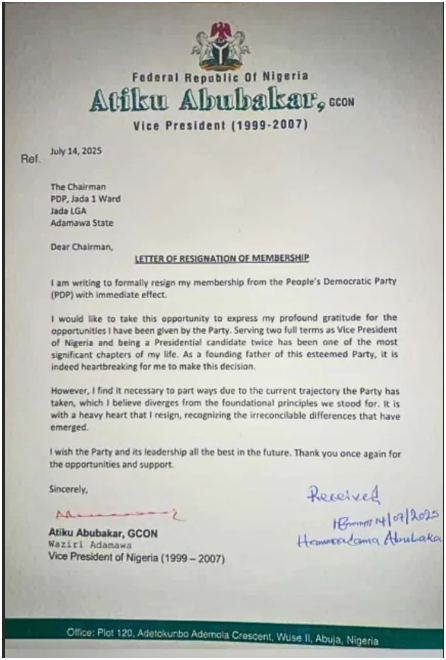Atiku Dumps PDP After 26 Years, Says Party Has ‘Lost Its Soul’ — Backs 2027 Coalition With ADC, Obidients
🗓️ 17 July 2025
🖋️ Byline: IDNN Political Desk
Abuja, Nigeria – Former vice president Atiku Abubakar has formally resigned from the People’s Democratic Party (PDP) after a 26-year relationship, marking a dramatic political shift just two years before the 2027 general elections.
In a statement issued on Wednesday morning and verified by IDNN, the 77-year-old former presidential candidate declared that the PDP had “lost its soul” and no longer reflected the values on which it was built.
“The PDP I joined in 1998 was founded on the principles of national unity, justice, and economic inclusion. Today’s PDP has abandoned these ideals,” he wrote.
Atiku’s resignation letter, sent to the PDP National Chairman and obtained by IDNN, accuses the current party leadership of turning the party into a “private enterprise” and alienating founding members and ideological allies.

From Resignation to Realignment
The announcement is already reshaping Nigeria’s political terrain. Atiku also confirmed long-rumored discussions about a formal merger or coalition with the African Democratic Congress (ADC) and key leaders of the Obidient Movement, including Peter Obi and Pat Utomi.
“What Nigeria needs in 2027 is not recycled parties but a coalition of conscience,” Atiku said.
“I am working towards building that platform.”
Sources close to the ongoing talks say a formal structure could be unveiled by October 2025, with negotiations centering on zoning, ideological platform, and a united convention.

PDP Under Fire — Internal Discontent Boils Over
Atiku’s resignation adds to a growing exodus of senior figures from the PDP, many of whom have accused the party of “directionless opposition” and being “soft on Tinubu’s policies.”
In his statement, Atiku warned that the PDP had become “morally bankrupt and intellectually lazy,” claiming that national opposition had now shifted to a grassroots realignment outside the old two-party system.
2027: The Third Force Finally Arrives?
Analysts say Atiku’s exit could energize the so-called third force movement, which has gained momentum since the 2023 elections that saw Peter Obi win 12 states and perform strongly in Lagos, Abuja, and Delta.
“This move brings credibility, structure, and war chest to the alternative movement,” said political analyst Zainab Rufai.
However, skeptics warn that Atiku’s alliance with a youthful, anti-establishment base may prove unstable, especially as generational and ideological tensions surface.
“Can Atiku, Obi, and Utomi truly sit at one table — or is this just an election-season handshake?” asked policy strategist Nduka Ogaziechi.
2027 Calculus: Who Leads the Coalition Ticket?
Atiku’s next political move will likely depend on how leadership for the coalition is structured. There is already speculation that he could either:
-
Run again, possibly under a unity platform;
-
Back a younger candidate, like Obi, and assume a statesman role;
-
Or broker the deal from behind the scenes, controlling Northern votes and political machinery.
No official declaration of candidacy was made, but sources say Atiku is positioning himself as the coalition’s “father of unity” going forward.
